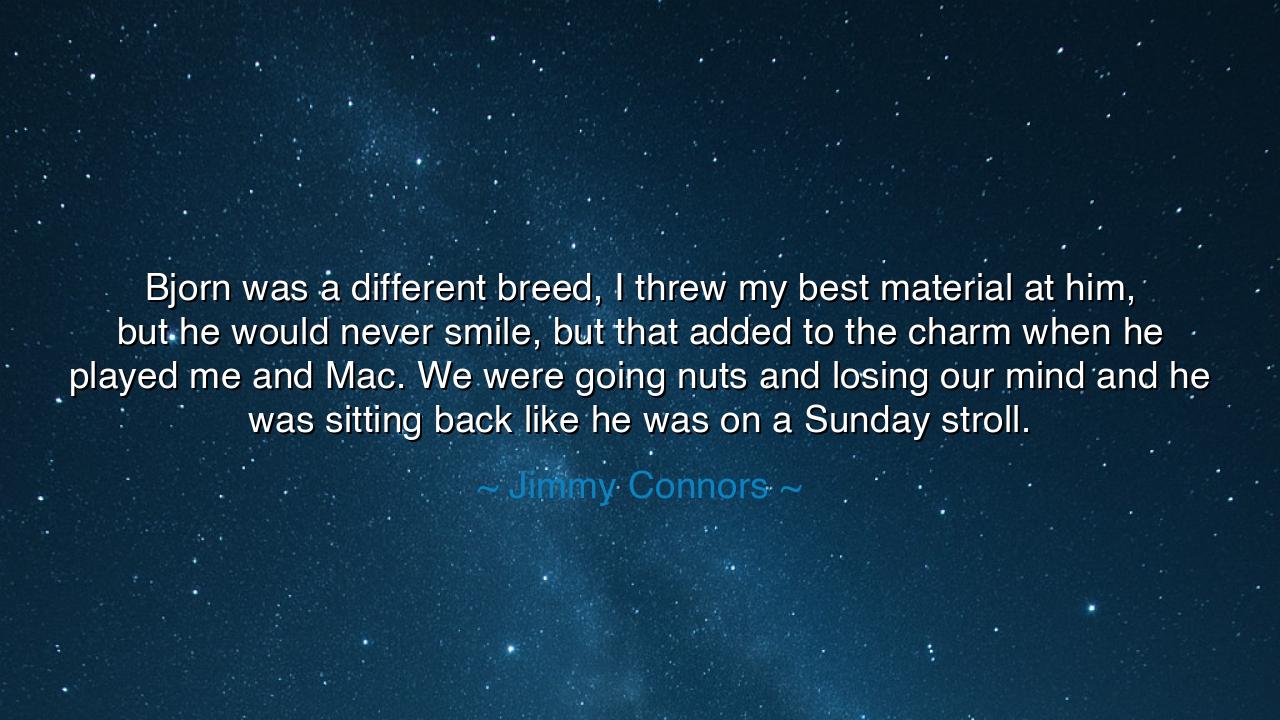
Bjorn was a different breed, I threw my best material at him, but
Bjorn was a different breed, I threw my best material at him, but he would never smile, but that added to the charm when he played me and Mac. We were going nuts and losing our mind and he was sitting back like he was on a Sunday stroll.






In the words of Jimmy Connors, spoken with both respect and wonder, we find a portrait of discipline and mystery: “Bjorn was a different breed, I threw my best material at him, but he would never smile, but that added to the charm when he played me and Mac. We were going nuts and losing our mind and he was sitting back like he was on a Sunday stroll.” Within these words lies more than commentary on a tennis rival. It is a teaching on composure, on strength of spirit, and on the quiet power that resists provocation.
The man Connors speaks of is Bjorn Borg, the Swedish master of the court, whose demeanor was unlike that of his fiery opponents. While Connors and John McEnroe raged and boiled with passion, Borg stood still as stone, a figure of serenity. He did not smile, he did not taunt, he did not betray his inner self to the crowd. And yet, this very silence was his weapon, this calm his shield. He was, as Connors declared, “a different breed.” For he understood that victory does not always belong to the loudest, but often to the one whose soul is most unshaken.
This truth has ancient echoes. The Stoic philosophers of Greece and Rome taught that the wise man is not disturbed by the fury of others, nor by fortune’s storms. Marcus Aurelius wrote, “Be like the cliff against which the waves continually break; but it stands firm and tames the fury of the waters around it.” Borg was such a cliff. Against him crashed the tempests of Connors and McEnroe, yet he remained unmoved, as if walking on a Sunday stroll while the world erupted around him. His strength was not in his racket alone, but in his refusal to let anger govern him.
Consider too the battlefield of Waterloo. The French marshals, fiery and desperate, hurled themselves at Wellington’s lines, confident that passion and force would break the enemy. Yet the Duke of Wellington, composed and restrained, commanded with the same calm Borg carried on the court. His soldiers later remarked that it was not his brilliance alone, but his composure under fire that gave them courage. Just as Borg’s stillness disarmed the fury of Connors and McEnroe, so Wellington’s calm steadied his men against the storm of Napoleon’s last charge. The lesson is timeless: stillness in the face of chaos is itself a weapon.
Connors admits that he and McEnroe were “going nuts and losing [their] mind,” and yet this frenzy only magnified Borg’s aura. For in contrast to their visible fire, his invisible ice became more potent. He made of his composure a charm, a mystery that drew the crowd into his silence. This is the paradox: sometimes what moves the hearts of others is not outward display, but inward mastery. Borg’s refusal to smile was not coldness—it was concentration, devotion to the game, and a reminder that true strength need not shout.
From these words we learn a path for our own lives. When others rage and flail, do not be quick to match their fury. When provoked, do not scatter your strength in needless outbursts. Instead, be as Borg was—steady, unmoved, focused on the goal. Let your calmness bewilder your enemies and inspire your friends. For passion without control burns itself out, but composure endures. The man who governs his own spirit is mightier than the one who conquers cities.
So, beloved listener, carry this lesson with you: cultivate calm amid storms, discipline amid temptations, and serenity amid provocations. Be not afraid if others call you distant or unyielding; often it is the quiet soul that stands tallest when the tempest has passed. Remember Borg upon the court, walking as if on a Sunday stroll while chaos surrounded him. Let that image live within you, and may your life, too, be a testament that stillness is not weakness but the highest form of power.






AAdministratorAdministrator
Welcome, honored guests. Please leave a comment, we will respond soon